|
A Far From Pointless Party
The annual Penguin crime party, held in one of the nicest crypts you could visit was, as usual, a convivial affair with many new authors to meet, mercifully short speeches to listen to and, of course, the opportunity to catch up with some old chums and colleagues.

This group of old hacks caught unawares by one of the many flamboyant paparazzi present (they seemed to be everywhere but in fact there was only one moving very fast) comprised Richard Reynolds (Heffers bookshop), Maxim Jakubowski (former owner of the legendary Murder One), author and journalist Jack Grimwood and myself, but we were soon tracking down the new authors for whom the party was an introduction to the whacky world of crime fiction.

To negate the startling height difference between us, Richard Osman agreed to pose for a picture which would suggest that he was near the camera and I was far, far, away. Unfortunately our photographer had little grasp of the theory of perspective…The point, however, was to welcome Richard to crime fiction in advance of his debut novel The Thursday Murder Club which will be published by Viking in September.

Another debutant it was a pleasure to meet was Stephanie Wrobel, whose novel The Recovery of Rose Gold is published this month by Michael Joseph, and which features later in this column as well as in the Shots review section where it is reviewed by the venerable Gwen Moffat; mountaineer, broadcaster and author of some thirty-five crime novels as well as being one of this eZine’s most distinguished reviewers.
So, no pressure then, Steph…
Revival Times
I have mentioned before my admiration for those innovative chaps at the Stark House Press in America, who have revived and republished books and authors which readers on this side of the Atlantic, are not familiar with – but should be.
I am proud to say I am familiar with Stark House’s latest addition to their list, and indeed with its author. Dead Horse by my old chum, that fine mystery writer Walter Satterthwait, is the story of another mystery writer, Raoul Whitfield, one of the pioneers of ‘pulp fiction’ in the glory days of Black Mask magazine. Apart from writing sensational stories for the ‘pulps’. Whitfield’s life story reads like one and Walter Satterthwait has given us a wonderful fictionalised version of it. (The Dead Horse of the title refers to the name of a ranch, not a victim.
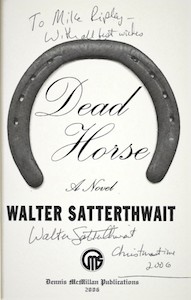
The novel was never published in the UK, but Walter sent me an inscribed copy of the 2006 US edition, which I treasure still, along with Walter’s fine historical mysteries (three of which I had the pleasure of editing in new editions) and his most excellent series featuring Santa Fé private eye Joshua Croft. What makes the Stark House revival more poignant is the fact that Walter, who has been unwell for some time with lung and heart problems, died in late February, at the ridiculously young age of 73, in a hospice in Seattle.
 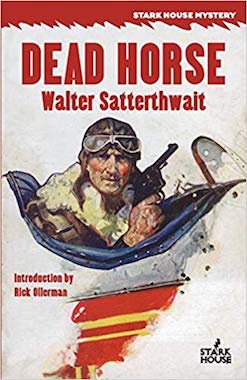
I can only wish my old friend well. The book, and all his backlist, I heartily recommend, in fact demand you read.
(And I must mention, though an afterthought hardly suffices, that Stark House are also republishing titles by Jean Potts, and if you’ve never heard of Jean Potts, then shame on you.)
Murder is Discovered
I was introduced to Shakespeare and Elizabethan drama in general by the musings of that grate skolar Sir Nigel Molesworth, who certainly appreciated the more violent aspects of the Bard’s work.
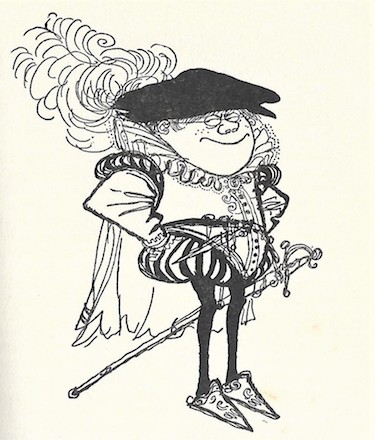
I had not fully appreciated just how much violence there was in the Shakespeare canon (no pun intended) with over 250 named characters being killed off in a variety of ways and only The Merry Wives of Windsor being completely free of any mention of death. Promoting Shakespeare as a prolific thriller writer, Kathryn Harkup’s Death By Shakespeare, out this month from Bloomsbury, does a wonderfully entertaining job of describing Shakespeare’s world, theatres and plays and listing the dangers an Elizabethan audience would have been familiar with including sword fights, dagger thrusts, poison, snake bite, mutilation, battle, public execution and probably bears exiting left.
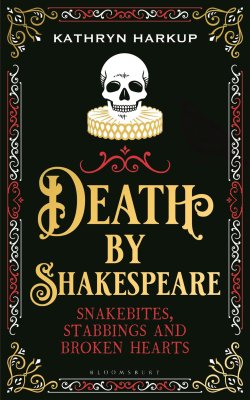
Kathryn Harkup also points out that the most common threat to the great unwashed theatre-goer in Elizabethan England, disease and the plague in particular, which often caused the closure of theatres, is hardly mentioned by Shakespeare. He was, after all, in the entertainment business and was very good at it.
And lest anyone think I have besmirched the academic credentials of Sir Nigel Molesworth, I would remind my readers of his famous homage to the Roman dramatists Plautus and Terence, The Hogwarts, which he wrote under the pen-name Marcus Plautus Molesworthus.
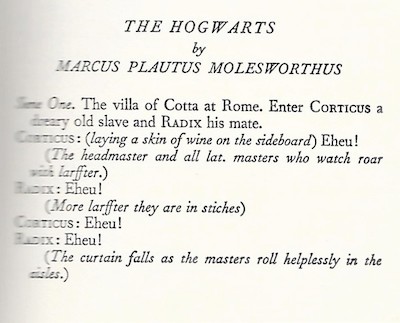
The full text of the play can be found in Sir Nigel’s book How To Be Topp, published in 1954, which is an autobiographical account of his days at a famous boarding school. I have no idea where the title of his play came from, but on reflection, it sounds like a jolly good name for a boarding school.
Unreported Crime
Many crimes go unreported and I have just discovered one, possibly two, so I am reporting it (them) here. I was recently prompted to check the shelves of my library when I spotted reports of the new No Exit Press editions of the late Ted Lewis’ thrillers Plender and GBH.
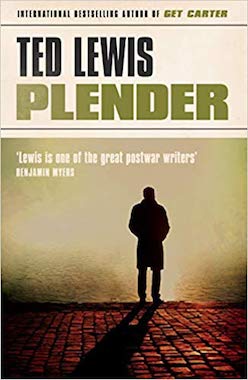 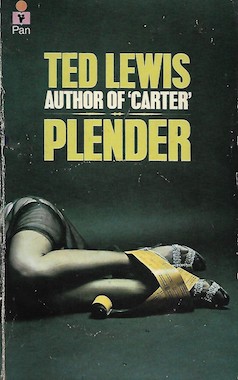
There was my much-read 1973 paperback edition of Plender, but of my copy of GBH there was no sign. Even worse, my copy of Nick Triplow’s biography of Ted Lewis (1940-82), Getting Carter, which I reviewed in December 2017, was also absent from its proper place on the shelf.
I never met Ted Lewis, though I did know Derek Raymond who claimed to have drunk with him in his Soho days and for a time, Lewis lived in a village in a Suffolk village which I used to visit regularly for week-end summer house parties, as one did in those days. However, I was never in any doubt that Lewis was a talented and important crime-writers and one of the godfathers of British noir.
So I am distressed at the double robbery which has taken place and resent the suggestion by the Chief Constable that this may be a case of me having loaned the books to someone, but forgotten who. Even if that was the case, they have not been returned, and therefore the perpetrator(s) must be hunted down…
The B Word
I promised last month that now Brexit was definitely all done and dusted and nobody has had to die in a ditch, it would never be mentioned in this column again: never, not ever, nevermore, never again, or at least sine die.
However… I never said anything about holding John Le Carré to such a rash promise and in his most excellent speech of acceptance on receiving the 2019 Olof Palme Prize in Stockholm in January he describes his despair at the way Britain ‘sleep-walked’ into Brexit. A full report of the speech can be found in The Guardian online here.
The speech also includes a good sidebar joke by the author when wondering whether Olof Palme, the respected Swedish prime Minister and statesman who was assassinated in 1985, was ever one of his readers.
Four Out of Five Spies
I was promised an early sight of a new book about the infamous Cambridge spy ring, Agent Molière by Geoff Andrews, published this month by I.B. Taurus, part of the Bloomsbury empire. The book, about John Caincross the “Fifth Man” in the ring which included Kim Philby, Guy Burgess, Donald Maclean and (Sir) Anthony Blunt, would have completed my education on that Cambridge quintet, but sadly has never materialised.
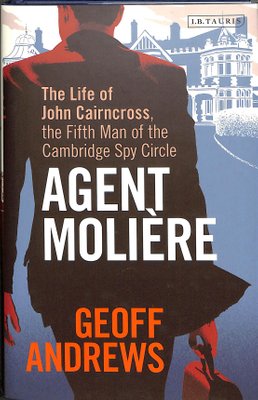
Back in 2010, Charles Cumming, that fine exponent of spy fiction, wrote a brilliant novel entitled The Trinity Six, which convinced me there were six spies in the Cambridge ring. However, having missed out on Geoff Andrews’ book, I am back to thinking there were perhaps only four.
Scandi Prep
At this year’s CrimeFest in June I expect to mingle with a longboat full of Nordic crime-writers and therefore have started my prep so I will be able to intelligently discuss the roots of their crime fiction.
Anyone who likes their thrillers to encompass travel to exotic locations (Russia, Sicily, Constantinople, Yorkshire), murders, conspiracies, dramatic escapes, battles, looting and more murders, will surely be familiar with King Harald’s Saga by Icelander Snorri Sturluson, which was (possibly) first published in 1230.
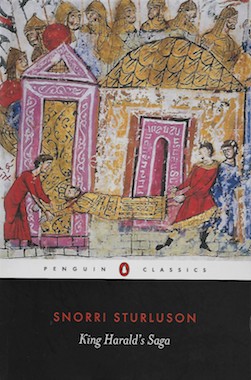
It tells the story of Harald Hardradi - Harald the Ruthless, or Harold Hadrada as I was taught at school - who was in fact King Harald III of Norway and could easily have become King Harold III of England but for a fatal encounter with Harold II at Stamford Bridge in 1066. (Look it up if you have to.)
Within the narrative are some fabulous subsidiary characters, including the poet Stuf the Blind, Earl Hakon the Powerful and, my favourite, Einar Paunch-Shaker, though as in the fictional one, in this game of thrones few characters survive to the end.
I look forward to discussing this saga in the long nights at CrimeFest as delegates sit around their great log fires after a hard day’s work on panels and meeting readers. Among them will be Eva Bjorg Ægisdóttir, Yrsa Sigurdardóttir and Antti Tuomainen and I am sure many others, but I have run out of special characters on my keyboard.
|
|
Books of the Month
Back in 2012 Dan Fesperman’s excellent spy thriller The Double Game used famous spy novels read by his main characters as a central plot mechanism. I remember being inordinately proud of the fact that I had read all but one of those referenced (and immediately sought out that one).
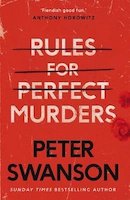
Now another American, Peter Swanson, has used the same technique for a murder mystery Rules For Perfect Murders, published here by Faber, which will provide hours of endless fun for the crime fiction aficionado, not just because it is an intriguing murder mystery in itself, but because it provides an excellent excuse for ‘train-spotting’ the many crime writers name-checked, from Agatha Christie and Patricia Highsmith to Simon Brett and John D. MacDonald (and a MacDonald I have never read, dammit!).
Rules For Perfect Murders revolves around a typical mystery bookshop owner: an introverted, shy, innocent loner (don’t be fooled), who once wrote a blog entitled Eight Perfect Murders, referring of course to fictional murders, which suddenly seem to be happening for real. Has he provided a template for a multiple murderer or is he the victim of a frame-up? Naturally, he has to investigate. Will he be helped or hindered by a wonderfully flaky FBI agent and his bookshop-owning partner, a prolific crime writer past his best and now dedicated to drinking himself into oblivion? (A vast number of drinks are also name-checked including Belhaven ale, which shows how sophisticated Boston is.)
As in all the best murder mysteries, there are twists, turns and back-tracking, with rarely a reliable narrator in sight, but most of the fun comes from seeing the (intended) references to famous crime novels (particularly The A.B.C. Murders, Double Indemnity and Strangers on a Train) before the characters do. I have one qualm only in that I do not agree that the most important thing about Malice Aforethought is that it shows a successful poisoning.
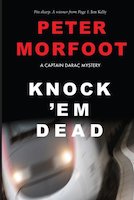
Peter Morfoot’s policiers featuring jazz-loving Captain Paul Darac of Nice’s Brigade Criminelle comprise one of the best crime series I have discovered in the last ten years. The fourth instalment, Knock ’Em Dead, is published by Galileo, and delivers on all fronts.
The lead detective, Darac, is a sympathetic character immersed in jazz and can be found playing at the Blue Devil club where musicians often outnumber customers, but when on duty is an intuitive and dedicated detective. He is supported by a well-drawn ensemble cast of police and forensic officers – and the forensics in Knock ’Em Dead are frighteningly convincing – and as he operates in Nice and the South of France, he (and the reader) has sunshine, great food and good wine on his side. For Darac, it is some compensation, along with a flourishing love life, for having to deal with crimes both brutal and bizarre, including, it seems, one death by high speed express train.
And as with any crime series set in a foreign country, the reader hopes to learn something they didn’t know about that country. I, for instance, did not know that it was possible, in a French police squad room, to get an octuple espresso, or that someone from Perpignan regards themselves as Catalan rather than French. I am also determined to discover for myself whether Suquet de peix really is superior to Bouillabaisse.
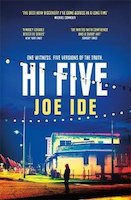
Joe Ide caused something of stir three books ago when he introduced his fictional private detective Isiah Quintabe and now ‘IQ’ (geddit?) is back patrolling the very mean streets of gangland Los Angeles in Hi Five from Weidenfeld & Nicholson, in a tale which is billed as Sherlock Holmes meets The Wire.
IQ reluctantly – very reluctantly – is persuaded to prove the innocence of the daughter of the nasty arms dealer Angus Byrne (a name out of an episode of Hamish Macbeth?) who has witnessed the murder of her boyfriend and is the prime suspect. Getting the daughter to tell what really happened is the problem as she suffers, big time, from multiple personality disorder. Which of the girl’s five radically different personalities will prove her innocence, or admit her guilt?
It is an intriguing problem, possibly a three-pipe one, and has to be solved against a back drop of rival gangs and random shoot-outs. All IQ has to rely on is his high intelligence and his knack of doing favours, which of course need returning, for just about everybody in the local community. He is not totally unarmed, however, and he defends himself (poorly) during a drive-by shooting with a ‘potato gun’ of his own making. The writing is sharp and the homage to Conan Doyle all too clear, though the setting, and also the writing, is much more brutal. There are times when, just as you occasionally wanted to give Sherlock a slap, you wonder why somebody in south central Los Angeles hasn’t busted a cap in IQ’s ass before now.

Hong Kong has been in the news a lot in recent months, mostly for unhappy reasons. So it might seem incongruous to welcome the good news from there in the form of a thriller which sounds as if it will appeal to fans of girls with dragon tattoos.
Second Sister by Chan Ho-Kei, published here by Head of Zeus, is a long and complex revenge thriller tapping into the zeitgeist when it comes to sexual harassment, online trolling, fake news and data privacy. It confirms all my worst fears about the dank, wet floor of the internet and anti-social media.
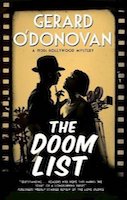
Tom Collins is a great name for an Irish private detective and 1921 Hollywood is a great setting in which to ply his trade. After a cinematically noir opening where a murdered body is found by some kids, The Doom List by Gerard O’Donovan (Severn House) moves on to the discovery of other nasty things hidden by the adults. And Hollywood at the height of the silent movie era, with its shiny stars and shady lawyers, seems to have been a hotbed of blackmail, extortion and the sort of sexism which judged actresses by means of “mattress exercise” (who knew such things went on in Hollywood?). No wonder that Decent Society needed to set moral standards and so the movie industry braces itself for a visit from William Harrison Hays, who may be compiling a Doom List of people who need censoring, and who was to give his name to the Code which specified how many feet had to remain on the floor during a love scene.
The Doom List is great fun, a cynical take on a cynical town flexing its muscles (in more ways than one if you include the orangutan star Joe Martin) with real characters from the period, including Rex Ingram the film director and not, as I first thought, the actor who excelled as the Djinn in the 1940 version of The Thief of Bagdad (sic).
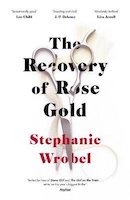
It is a courageous debut crime writer who produces a novel with basically only two characters and gives them alternate chapters of first-person narration. It is a very brave writer who makes the twin narrators both unreliable and very easy to dislike. In The Recovery of Rose Gold by Stephanie Wrobel, published by Michael Joseph, neither the Rose Gold of the title or her mother Patty are, in the words of the late Sarah Caudwell, people ‘you would want to be stuck at a bus stop with’, and their psychological battle of wills is, you just know, going to end badly for one or both of them.
That the main battleground of the book involves eating disorders real and possibly imagined, and indeed eating and food in general, could put off the more squeamish. Basically, Rose Gold has throughout her childhood, been abused by her mother, who has weaponised eating disorders to an appalling degree resulting in an emotional scarred daughter whose teeth have rotted to ghoulish stumps. As a young adult Rose Gold is obsessed with saving up enough cash to pay for dental braces but, in a key plot-twist, spends the money on a house instead. (Making one wonder at the cost of American dentistry.) It is not the only crazy thing she does.
There are several Americanisms which might raise an eyebrow here (I had no idea what a Chia Pet was and was slightly surprised that carry-cots were still called ‘bassinets’ in the US), but to be fair it is set in America in a small town aptly (too aptly?) named Deadwick. And there is a lot about food, all done – forgive me but I cannot resist – in the worst possible taste.
If you can stomach (sorry!) the subject matter – not only eating disorders but also child abuse – there is no doubt this is a powerful example of psychological suspense and though saying it was an example of revenge being best-served cold, or at least as a microwaved TV dinner, would be going too far, it is a gripping story of obsession and, I suspect, shows a crime-writer flexing her muscles at the start of a promising career.

A few years ago I predicted that World War II would become an increasingly popular setting for crime and thriller writers and, as usual, was proved right. One of the more interesting series detectives to emerge recently is Jim Kelly’s Inspector Eden Brooke, who returns this month in The Night Raids from Allison & Busby.
Brooke is a ‘nighthawk’, not in the archaeological sense but because of injuries sustained in WWI, he suffers from photophobia, an extreme sensitivity to light, which means he does his best work at night or, indeed, in badly-lit pubs. Detective Inspector Brooke’s beat is Cambridge in the early years of the war and in The Night Raids, he not only has to contend with regular, civilian crime, but also a mysterious chemical found in the River Cam and a very nasty case of looting, not to mention the bombing raids of the title, courtesy of the Luftwaffe. On this latter point, I have to take issue with the author (and his editor) as he constantly refers to ‘shells’ being dropped from a Heinkel bomber. I will pass over the fact that the Heinkel’s crew deal in feet rather than metres (is this a side-effect of Brexit?), but bombers drop bombs, not shells. Still, all is forgiven when I am reminded that Eden Brooke is also an alumnus of Michaelhouse, one of the most distinguished yet strangely unrecognised of the Cambridge colleges.
TMBTLT
(Too Many Books, Too Little Time)
As always happens in a short month with unforgiving deadlines, I received some excellent books but not the additional time to do them justice. However, from track records, advance publicity, favourable gossip and the skimpiest of samplings, I can confidently recommend the following ‘sight unseen’ or at least almost unread.
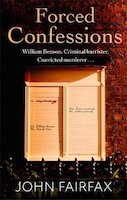 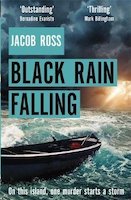 
John Fairfax is the pen-name of William Brodrick, who gave up life as an Augustine Friar to become a barrister and then wrote a successful series of crime novels about Father Anselm, who gave up a career as a barrister to become ordained. In Forced Confessions (Little Brown) and wearing his John Fairfax hat, he stays with the law but this time his protagonist is a barrister who has a conviction for murder in his past (actually this is the third in this series). I am quite happy to believe Brodrick/Fairfax on all legal matters as he is, I am told, the holder of the ‘degree of Utter Barrister’ which I thought at first was rather fanciful until I remembered it referred to the ‘Outer’ Bar rather than the Inner Bar, which I have always referred to as the Snug.
Jacob Ross is an acclaimed novelist and short story writer who has recently turned to crime fiction with a distinctive Caribbean flavour. Black Rain Falling, published this month by Sphere, is set on the island of Camaho with its unorthodox CID unit (poachers-turned-gamekeepers) tackling an all-too orthodox menu of crimes in an ingrained atmosphere of corruption and mistrust. Do not expect the light entertainment values of Murder In Paradise, but be prepared to be surprised and impressed by a fast-paced story told in a unique and lyrical voice.
C.J. (‘Chuck’) Box is really a very charming guy and not at all the cowboy-in-the-black-hat gunslinger you might expect from his author picture on many a book jacket. Long Range (Head of Zeus) is the twentieth novel to feature Joe Pickett, his Wyoming game warden and series hero, and the story begins with, as you might expect, a long range rifle shot – and one described in minute detail. There are a lot of guns in Long Range but the book is far more than a shoot-em-up modern western and shows that even the natural beauty of wild Wyoming has not been spared the curse of the illicit trade in, and addiction to, prescription drugs. There is also an acute social observation by one character – That’s what Americans did…they stared at their phones – which doesn’t apply just to Americans, Chuck; trust me.
Pip! Pip!
The Ripster
|